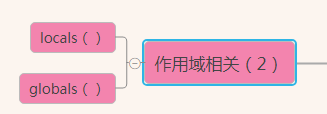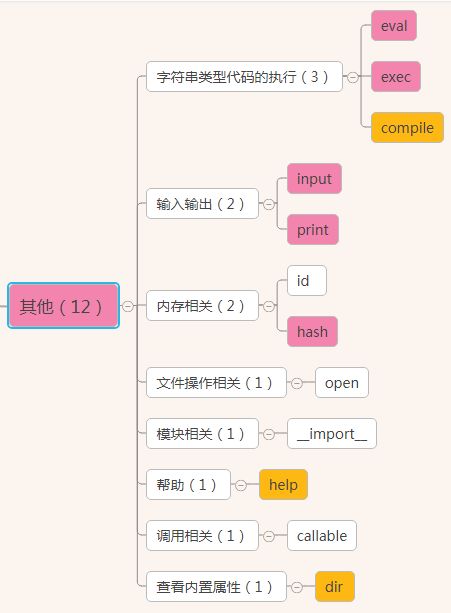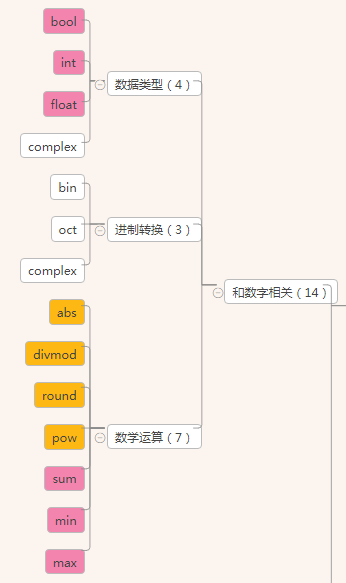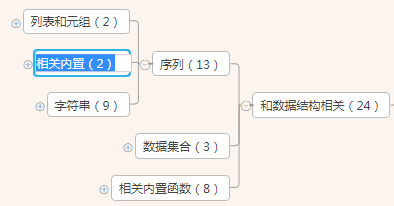python内置函数与匿名函数
内置函数
| Built-in Functions | ||||
|---|---|---|---|---|
| abs() | dict() | help() | min() | setattr() |
| all() | dir() | hex() | next() | slice() |
| any() | divmod() | id() | object() | sorted() |
| ascii() | enumerate() | input() | oct() | staticmethod() |
| bin() | eval() | int() | open() | str() |
| bool() | exec() | isinstance() | pow() | super() |
| bytes() | float() | iter() | print() | tuple() |
| callable() | format() | len() | property() | type() |
| chr() | frozenset() | list() | range() | vars() |
| classmethod() | getattr() | locals() | repr() | zip() |
| compile() | globals() | map() | reversed() | __import__() |
| complex() | hasattr() | max() | round() | |
| bytearray() | filter() | issubclass() | pow() | super() |
| delattr() | hash() | memoryview() | set | |
截止到python版本3.6.2,现在python一共为我们提供了68个内置函数。它们就是python提供给你直接可以拿来使用的所有函数。
内置函数分类

作用域相关

基于字典的形式获取局部变量和全局变量
globals()——获取全局变量的字典
locals()——获取执行本方法所在命名空间内的局部变量的字典
其他

输入输出相关
input()输入

s = input("请输入内容 : ") #输入的内容赋值给s变量 print(s) #输入什么打印什么。数据类型是str
print输出

1 def print(self, *args, sep=' ', end='\n', file=None): # known special case of print 2 """ 3 print(value, ..., sep=' ', end='\n', file=sys.stdout, flush=False) 4 file: 默认是输出到屏幕,如果设置为文件句柄,输出到文件 5 sep: 打印多个值之间的分隔符,默认为空格 6 end: 每一次打印的结尾,默认为换行符 7 flush: 立即把内容输出到流文件,不作缓存 8 """

1 f = open('tmp_file','w') 2 print(123,456,sep=',',file = f,flush=True)

1 from time import sleep 2 for i in range(0,101,2): 3 sleep(0.1) 4 str="*"*(i//2) 5 print('\r%s%%:%s'%(i,str),end="",flush=True)
数据类型相关
type(s)返回s的数据类型

s="abc" print(type(s))#<class 'str'>
内存相关
id(s) s是参数,返回一个变量的内存地址
hash(s) s是参数,返回一个可hash变量的哈希值,不可hash的变量被hash之后会报错。

1 l1=[1,2,3] 2 l2=(1,2,3) 3 print(hash(l2))#2528502973977326415 4 print(hash(l1))#TypeError: unhashable type: 'list'
hash函数会根据一个内部的算法对当前可hash变量进行处理,返回一个int数字。
*每一次执行程序,内容相同的变量hash值在这一次执行过程中不会发生改变。
文件操作相关
open() 打开一个文件,返回一个文件操作符(文件句柄)
操作文件的模式有r,w,a,r+,w+,a+ 共6种,每一种方式都可以用二进制的形式操作(rb,wb,ab,rb+,wb+,ab+)
可以用encoding指定编码.
模块操作相关
__import__导入一个模块

os = __import__('os') print(os.path.abspath('.'))
帮助方法
help(s) s为函数名

1 help(str) 2 3 4 #输出 5 class str(object) 6 | str(object='') -> str 7 | str(bytes_or_buffer[, encoding[, errors]]) -> str 8 | 9 | Create a new string object from the given object. If encoding or 10 | errors is specified, then the object must expose a data buffer 11 | that will be decoded using the given encoding and error handler. 12 | Otherwise, returns the result of object.__str__() (if defined) 13 | or repr(object). 14 | encoding defaults to sys.getdefaultencoding(). 15 | errors defaults to 'strict'. 16 | 17 | Methods defined here: 18 | 19 | __add__(self, value, /) 20 | Return self+value. 21 | 22 | __contains__(self, key, /) 23 | Return key in self. 24 | 25 | __eq__(self, value, /) 26 | Return self==value. 27 | 28 | __format__(...) 29 | S.__format__(format_spec) -> str 30 | 31 | Return a formatted version of S as described by format_spec. 32 | 33 | __ge__(self, value, /) 34 | Return self>=value. 35 | 36 | __getattribute__(self, name, /) 37 | Return getattr(self, name). 38 | 39 | __getitem__(self, key, /) 40 | Return self[key]. 41 | 42 | __getnewargs__(...) 43 | 44 | __gt__(self, value, /) 45 | Return self>value. 46 | 47 | __hash__(self, /) 48 | Return hash(self). 49 | 50 | __iter__(self, /) 51 | Implement iter(self). 52 | 53 | __le__(self, value, /) 54 | Return self<=value. 55 | 56 | __len__(self, /) 57 | Return len(self). 58 | 59 | __lt__(self, value, /) 60 | Return self<value. 61 | 62 | __mod__(self, value, /) 63 | Return self%value. 64 | 65 | __mul__(self, value, /) 66 | Return self*value.n 67 | 68 | __ne__(self, value, /) 69 | Return self!=value. 70 | 71 | __new__(*args, **kwargs) from builtins.type 72 | Create and return a new object. See help(type) for accurate signature. 73 | 74 | __repr__(self, /) 75 | Return repr(self). 76 | 77 | __rmod__(self, value, /) 78 | Return value%self. 79 | 80 | __rmul__(self, value, /) 81 | Return self*value. 82 | 83 | __sizeof__(...) 84 | S.__sizeof__() -> size of S in memory, in bytes 85 | 86 | __str__(self, /) 87 | Return str(self). 88 | 89 | capitalize(...) 90 | S.capitalize() -> str 91 | 92 | Return a capitalized version of S, i.e. make the first character 93 | have upper case and the rest lower case. 94 | 95 | casefold(...) 96 | S.casefold() -> str 97 | 98 | Return a version of S suitable for caseless comparisons. 99 | 100 | center(...) 101 | S.center(width[, fillchar]) -> str 102 | 103 | Return S centered in a string of length width. Padding is 104 | done using the specified fill character (default is a space) 105 | 106 | count(...) 107 | S.count(sub[, start[, end]]) -> int 108 | 109 | Return the number of non-overlapping occurrences of substring sub in 110 | string S[start:end]. Optional arguments start and end are 111 | interpreted as in slice notation. 112 | 113 | encode(...) 114 | S.encode(encoding='utf-8', errors='strict') -> bytes 115 | 116 | Encode S using the codec registered for encoding. Default encoding 117 | is 'utf-8'. errors may be given to set a different error 118 | handling scheme. Default is 'strict' meaning that encoding errors raise 119 | a UnicodeEncodeError. Other possible values are 'ignore', 'replace' and 120 | 'xmlcharrefreplace' as well as any other name registered with 121 | codecs.register_error that can handle UnicodeEncodeErrors. 122 | 123 | endswith(...) 124 | S.endswith(suffix[, start[, end]]) -> bool 125 | 126 | Return True if S ends with the specified suffix, False otherwise. 127 | With optional start, test S beginning at that position. 128 | With optional end, stop comparing S at that position. 129 | suffix can also be a tuple of strings to try. 130 | 131 | expandtabs(...) 132 | S.expandtabs(tabsize=8) -> str 133 | 134 | Return a copy of S where all tab characters are expanded using spaces. 135 | If tabsize is not given, a tab size of 8 characters is assumed. 136 | 137 | find(...) 138 | S.find(sub[, start[, end]]) -> int 139 | 140 | Return the lowest index in S where substring sub is found, 141 | such that sub is contained within S[start:end]. Optional 142 | arguments start and end are interpreted as in slice notation. 143 | 144 | Return -1 on failure. 145 | 146 | format(...) 147 | S.format(*args, **kwargs) -> str 148 | 149 | Return a formatted version of S, using substitutions from args and kwargs. 150 | The substitutions are identified by braces ('{' and '}'). 151 | 152 | format_map(...) 153 | S.format_map(mapping) -> str 154 | 155 | Return a formatted version of S, using substitutions from mapping. 156 | The substitutions are identified by braces ('{' and '}'). 157 | 158 | index(...) 159 | S.index(sub[, start[, end]]) -> int 160 | 161 | Return the lowest index in S where substring sub is found, 162 | such that sub is contained within S[start:end]. Optional 163 | arguments start and end are interpreted as in slice notation. 164 | 165 | Raises ValueError when the substring is not found. 166 | 167 | isalnum(...) 168 | S.isalnum() -> bool 169 | 170 | Return True if all characters in S are alphanumeric 171 | and there is at least one character in S, False otherwise. 172 | 173 | isalpha(...) 174 | S.isalpha() -> bool 175 | 176 | Return True if all characters in S are alphabetic 177 | and there is at least one character in S, False otherwise. 178 | 179 | isdecimal(...) 180 | S.isdecimal() -> bool 181 | 182 | Return True if there are only decimal characters in S, 183 | False otherwise. 184 | 185 | isdigit(...) 186 | S.isdigit() -> bool 187 | 188 | Return True if all characters in S are digits 189 | and there is at least one character in S, False otherwise. 190 | 191 | isidentifier(...) 192 | S.isidentifier() -> bool 193 | 194 | Return True if S is a valid identifier according 195 | to the language definition. 196 | 197 | Use keyword.iskeyword() to test for reserved identifiers 198 | such as "def" and "class". 199 | 200 | islower(...) 201 | S.islower() -> bool 202 | 203 | Return True if all cased characters in S are lowercase and there is 204 | at least one cased character in S, False otherwise. 205 | 206 | isnumeric(...) 207 | S.isnumeric() -> bool 208 | 209 | Return True if there are only numeric characters in S, 210 | False otherwise. 211 | 212 | isprintable(...) 213 | S.isprintable() -> bool 214 | 215 | Return True if all characters in S are considered 216 | printable in repr() or S is empty, False otherwise. 217 | 218 | isspace(...) 219 | S.isspace() -> bool 220 | 221 | Return True if all characters in S are whitespace 222 | and there is at least one character in S, False otherwise. 223 | 224 | istitle(...) 225 | S.istitle() -> bool 226 | 227 | Return True if S is a titlecased string and there is at least one 228 | character in S, i.e. upper- and titlecase characters may only 229 | follow uncased characters and lowercase characters only cased ones. 230 | Return False otherwise. 231 | 232 | isupper(...) 233 | S.isupper() -> bool 234 | 235 | Return True if all cased characters in S are uppercase and there is 236 | at least one cased character in S, False otherwise. 237 | 238 | join(...) 239 | S.join(iterable) -> str 240 | 241 | Return a string which is the concatenation of the strings in the 242 | iterable. The separator between elements is S. 243 | 244 | ljust(...) 245 | S.ljust(width[, fillchar]) -> str 246 | 247 | Return S left-justified in a Unicode string of length width. Padding is 248 | done using the specified fill character (default is a space). 249 | 250 | lower(...) 251 | S.lower() -> str 252 | 253 | Return a copy of the string S converted to lowercase. 254 | 255 | lstrip(...) 256 | S.lstrip([chars]) -> str 257 | 258 | Return a copy of the string S with leading whitespace removed. 259 | If chars is given and not None, remove characters in chars instead. 260 | 261 | partition(...) 262 | S.partition(sep) -> (head, sep, tail) 263 | 264 | Search for the separator sep in S, and return the part before it, 265 | the separator itself, and the part after it. If the separator is not 266 | found, return S and two empty strings. 267 | 268 | replace(...) 269 | S.replace(old, new[, count]) -> str 270 | 271 | Return a copy of S with all occurrences of substring 272 | old replaced by new. If the optional argument count is 273 | given, only the first count occurrences are replaced. 274 | 275 | rfind(...) 276 | S.rfind(sub[, start[, end]]) -> int 277 | 278 | Return the highest index in S where substring sub is found, 279 | such that sub is contained within S[start:end]. Optional 280 | arguments start and end are interpreted as in slice notation. 281 | 282 | Return -1 on failure. 283 | 284 | rindex(...) 285 | S.rindex(sub[, start[, end]]) -> int 286 | 287 | Return the highest index in S where substring sub is found, 288 | such that sub is contained within S[start:end]. Optional 289 | arguments start and end are interpreted as in slice notation. 290 | 291 | Raises ValueError when the substring is not found. 292 | 293 | rjust(...) 294 | S.rjust(width[, fillchar]) -> str 295 | 296 | Return S right-justified in a string of length width. Padding is 297 | done using the specified fill character (default is a space). 298 | 299 | rpartition(...) 300 | S.rpartition(sep) -> (head, sep, tail) 301 | 302 | Search for the separator sep in S, starting at the end of S, and return 303 | the part before it, the separator itself, and the part after it. If the 304 | separator is not found, return two empty strings and S. 305 | 306 | rsplit(...) 307 | S.rsplit(sep=None, maxsplit=-1) -> list of strings 308 | 309 | Return a list of the words in S, using sep as the 310 | delimiter string, starting at the end of the string and 311 | working to the front. If maxsplit is given, at most maxsplit 312 | splits are done. If sep is not specified, any whitespace string 313 | is a separator. 314 | 315 | rstrip(...) 316 | S.rstrip([chars]) -> str 317 | 318 | Return a copy of the string S with trailing whitespace removed. 319 | If chars is given and not None, remove characters in chars instead. 320 | 321 | split(...) 322 | S.split(sep=None, maxsplit=-1) -> list of strings 323 | 324 | Return a list of the words in S, using sep as the 325 | delimiter string. If maxsplit is given, at most maxsplit 326 | splits are done. If sep is not specified or is None, any 327 | whitespace string is a separator and empty strings are 328 | removed from the result. 329 | 330 | splitlines(...) 331 | S.splitlines([keepends]) -> list of strings 332 | 333 | Return a list of the lines in S, breaking at line boundaries. 334 | Line breaks are not included in the resulting list unless keepends 335 | is given and true. 336 | 337 | startswith(...) 338 | S.startswith(prefix[, start[, end]]) -> bool 339 | 340 | Return True if S starts with the specified prefix, False otherwise. 341 | With optional start, test S beginning at that position. 342 | With optional end, stop comparing S at that position. 343 | prefix can also be a tuple of strings to try. 344 | 345 | strip(...) 346 | S.strip([chars]) -> str 347 | 348 | Return a copy of the string S with leading and trailing 349 | whitespace removed. 350 | If chars is given and not None, remove characters in chars instead. 351 | 352 | swapcase(...) 353 | S.swapcase() -> str 354 | 355 | Return a copy of S with uppercase characters converted to lowercase 356 | and vice versa. 357 | 358 | title(...) 359 | S.title() -> str 360 | 361 | Return a titlecased version of S, i.e. words start with title case 362 | characters, all remaining cased characters have lower case. 363 | 364 | translate(...) 365 | S.translate(table) -> str 366 | 367 | Return a copy of the string S in which each character has been mapped 368 | through the given translation table. The table must implement 369 | lookup/indexing via __getitem__, for instance a dictionary or list, 370 | mapping Unicode ordinals to Unicode ordinals, strings, or None. If 371 | this operation raises LookupError, the character is left untouched. 372 | Characters mapped to None are deleted. 373 | 374 | upper(...) 375 | S.upper() -> str 376 | 377 | Return a copy of S converted to uppercase. 378 | 379 | zfill(...) 380 | S.zfill(width) -> str 381 | 382 | Pad a numeric string S with zeros on the left, to fill a field 383 | of the specified width. The string S is never truncated. 384 | 385 | ---------------------------------------------------------------------- 386 | Static methods defined here: 387 | 388 | maketrans(x, y=None, z=None, /) 389 | Return a translation table usable for str.translate(). 390 | 391 | If there is only one argument, it must be a dictionary mapping Unicode 392 | ordinals (integers) or characters to Unicode ordinals, strings or None. 393 | Character keys will be then converted to ordinals. 394 | If there are two arguments, they must be strings of equal length, and 395 | in the resulting dictionary, each character in x will be mapped to the 396 | character at the same position in y. If there is a third argument, it 397 | must be a string, whose characters will be mapped to None in the result.
在控制台执行help()进入帮助模式。可以随意输入变量或者变量的类型。输入q退出
或者直接执行help(o),o是参数,查看和变量o有关的操作。。。
和调用相关
callable(s),s是参数,看这个变量是不是可调用。
如果s是一个函数名,就会返回True

1 def func():pass 2 print(callable(func))#True 3 print(callable(123))#Flase
查看参数所属类型的所有内置方法
dir() 默认查看全局空间内的属性,也接受一个参数,查看这个参数内的方法或变量

1 dir(list) 2 3 4 5 6 ['__add__', '__class__', '__contains__', '__delattr__', '__delitem__', '__dir__', '__doc__', '__eq__', '__format__', '__ge__', '__getattribute__', '__getitem__', '__gt__', '__hash__', '__iadd__', '__imul__', '__init__', '__init_subclass__', '__iter__', '__le__', '__len__', '__lt__', '__mul__', '__ne__', '__new__', '__reduce__', '__reduce_ex__', '__repr__', '__reversed__', '__rmul__', '__setattr__', '__setitem__', '__sizeof__', '__str__', '__subclasshook__', 'append', 'clear', 'copy', 'count', 'extend', 'index', 'insert', 'pop', 'remove', 'reverse', 'sort']
和数字相关

数字——数据类型相关:bool,int,float,complex
数字——进制转换相关:bin,oct,hex
数字——数学运算:abs,divmod,min,max,sum,round,pow
和数据结构相关

序列——列表和元组相关的:list和tuple
序列——字符串相关的:str,format,bytes,bytearry,memoryview,ord,chr,ascii,repr

1 ret=bytearray('xiaozhangmen',encoding='utf-8') 2 print(ret)#bytearray(b'xiaozhangmen')

1 ret = memoryview(bytes('你好',encoding='utf-8')) 2 print(len(ret)) 3 print(bytes(ret[:3]).decode('utf-8')) 4 print(bytes(ret[3:]).decode('utf-8'))
序列:reversed,slice

1 l=[1,2,3,4,5,6] 2 l.reverse() 3 print(l)#[6, 5, 4, 3, 2, 1]

1 l=[1,2,3,4,5,6] 2 sli=slice(1,4,2)#slice看起来返回的是一个规则,拿到这个规则后再对列表进行操作 3 print(l[sli])#[2, 4]
数据集合——字典和集合:dict,set,frozenset
数据集合:len,sorted,enumerate,all,any,zip,filter,map
filter:使用指定方法过滤可迭代对象的元素

1 def is_odd(x): 2 return x % 2 == 1 3 print(filter(is_odd,[1,2,3,4,5,6]))#<filter object at 0x00000000022EC240> 4 print(list(filter(is_odd,[1,2,3,4,5,6])))#[1, 3, 5]
map:python中的map函数应用于每一个可迭代的项,返回的是一个结果list。如果有其他的可迭代参数传进来,map函数则会把每一个参数都以相应的处理函数进行迭代处理。map()函数接收两个参数,一个是函数,一个是序列,map将传入的函数依次作用到序列的每个元素,并把结果作为新的list返回。

1 def pow(x): 2 return x**2 3 print(map(pow,[0,1,2,3]))#<map object at 0x000000000291C1D0> 4 print(list(map(pow,[0,1,2,3])))#[0, 1, 4, 9]
匿名函数
匿名函数:为了解决那些功能很简单的需求而设计的一句话函数
匿名函数格式:
函数名 = lambda 参数 :返回值 #参数可以有多个,用逗号隔开 #匿名函数不管逻辑多复杂,只能写一行,且逻辑执行结束后的内容就是返回值 #返回值和正常的函数一样可以是任意数据类型
匿名函数实例
1 #如把下面函数改为匿名函数 2 def add(x,y): 3 return x+y 4 5 add1=lambda x,y:x+y 6 7 print(add(1,2)) 8 print(add1(1,2))
面试题笔记:
现有两个元组(('a'),('b')),(('c'),('d')),请使用python中匿名函数生成列表[{'a':'c'},{'b':'d'}]

1 #答案一 2 test = lambda t1,t2 :[{i:j} for i,j in zip(t1,t2)] 3 print(test(t1,t2)) 4 #答案二 5 print(list(map(lambda t:{t[0]:t[1]},zip(t1,t2)))) 6 #还可以这样写 7 print([{i:j} for i,j in zip(t1,t2)])

1 1.下面程序的输出结果是: 2 d = lambda p:p*2 3 t = lambda p:p*3 4 x = 2 5 x = d(x) 6 x = t(x) 7 x = d(x) 8 print x 9 10 2.现有两元组(('a'),('b')),(('c'),('d')),请使用python中匿名函数生成列表[{'a':'c'},{'b':'d'}] 11 12 3.以下代码的输出是什么?请给出答案并解释。 13 def multipliers(): 14 return [lambda x:i*x for i in range(4)] 15 print([m(2) for m in multipliers()]) 16 请修改multipliers的定义来产生期望的结果。




